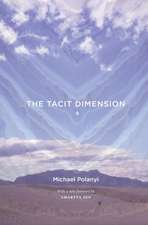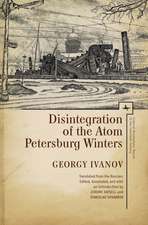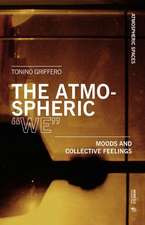Atmospheres: Aesthetics of Emotional Spaces
Autor Tonino Grifferoen Limba Engleză Paperback – 11 noi 2016
| Toate formatele și edițiile | Preț | Express |
|---|---|---|
| Paperback (1) | 461.66 lei 43-57 zile | |
| Taylor & Francis – 11 noi 2016 | 461.66 lei 43-57 zile | |
| Hardback (1) | 999.51 lei 43-57 zile | |
| Taylor & Francis – 28 mai 2014 | 999.51 lei 43-57 zile |
Preț: 461.66 lei
Nou
Puncte Express: 692
Preț estimativ în valută:
88.35€ • 91.90$ • 72.94£
88.35€ • 91.90$ • 72.94£
Carte tipărită la comandă
Livrare economică 14-28 aprilie
Preluare comenzi: 021 569.72.76
Specificații
ISBN-13: 9781138247710
ISBN-10: 1138247715
Pagini: 180
Dimensiuni: 156 x 234 x 12 mm
Greutate: 0.27 kg
Ediția:1
Editura: Taylor & Francis
Colecția Routledge
Locul publicării:Oxford, United Kingdom
ISBN-10: 1138247715
Pagini: 180
Dimensiuni: 156 x 234 x 12 mm
Greutate: 0.27 kg
Ediția:1
Editura: Taylor & Francis
Colecția Routledge
Locul publicării:Oxford, United Kingdom
Notă biografică
Tonino Griffero is an Italian philosopher and Professor of Aesthetics at the University of Rome, Tor Vergata, Italy.
Recenzii
'It was Tonino Griffero who first made the theory of atmospheres known to the Italian audience. We now appreciate even more his publishing the book in English, which not only describes the phenomenology and theory of atmospheres, but sets this within its historical and international context.' Gernot Böhme, Professor of Philosophy emeritus, Technical University of Darmstadt and Director of the Institute for Practical Philosophy in Darmstadt, Germany 'After the pioneering studies by several German philosophers, the notion of atmosphere is currently awaking widening interest around the world. Tonino Griffero presents here a learned, humane and dense survey of the ontology, history and phenomenology of atmospheric perception. Our amazing capacity to grasp complex and integrated sensory and emotive entities could well be named our sixth sense. As Griffero argues, atmospheric perception is a holistic and emotional being-in-the-world.' Juhani Pallasmaa, architect and Professor of Architecture emeritus, Finland
Cuprins
Chapter 1 Introduction Not to Leave Vagueness (but to Stay in it in the Right Way); Chapter 1a Atmospheric Perception; Chapter 2 History of the Concept of Atmosphere; Chapter 3 Atmospherology; conclusion Conclusion;
Descriere
This book examines the role of atmospheres in daily life, and defines their main characteristics. Outlining the typical phenomenological situations in which we experience atmospheres, it assesses their impact on contemporary aesthetics. It puts forward a philosophical approach which systematises a constellation of affects and climates, finds patterns in the emotional tones of different spaces (affordances) and assesses their impact on the felt body. It also critically discusses the spatial turn invoked by several of the social sciences, and argues that there is a need for a non-psychologistic rethinking of the philosophy of emotions.




















